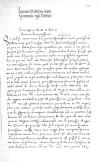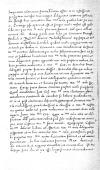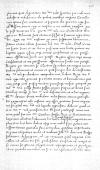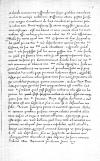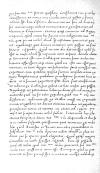Quod si omnes meae litterae pervenissent ad Maiestatem Vestram superinscribed⌈ad Maiestatem Vestramad Maiestatem Vestram superinscribed⌉, foret mihi gratissimum, ex his enim, quae hucusque acta hic sunt, intellexisset omnia, et quia in dubio sum, cogor quaedam, quae antea a me fuerunt scripta, sed breviter repetere. Superioribus diebus scripsi, quomodo omni diligentia, quantum mihi erat possibile, negotium hoc, in quo me Maiestas Vestra huc misit, sollicitassem semper, etiam sine intermissione, sic etiam, quod ⌊orator⌋ iste, qui hic ab ⌊illustrissima domina duce Mediolani⌋ agit, me, nescio quam ob causam, rogavit, ut me a tam crebra sollicitatione continerem. Sed cum viderem, quod expediret, ut sollicitarem, feci nihilominus, quae potui omnia, ut in hodiernum diem in procrastinatione fuerunt posita et nihil aliud de die in diem, quam verba mihi dabantu. Ivi igitur prout hactenus feci saepius ad regem tunc adhuc catholicum, et ⌊maiestatem eius⌋ nomine Maiestatis Vestrae Sacrae omni studio rogavi, ut tandem post tot promissa me expediret. ⌊Sua maiestas⌋, ut est optimus iuvenis, et qui videtur Maiestatem Vestram plurimum amare, promisit mihi expeditionem antequam dominus ⌊de Szeveris⌋ et ⌊magnus cancellarius⌋ irent in ⌊Montem Pessulanum⌋ ad Gallicum conventum. Eo die, quo illi ituri erant, iterum ⌊regem⌋ accessi admonendo eum de promisso. Respondit: „Verum est, promisi tibi, sed nequeo pro nunc servare promissum, numquam curia mea magis fuit occupata quam nunc. Rogo, feras moram hanc patienter, donec isti abierint, omnia tunc erunt tranquilliora, intendam, quantum est possibile citius, ut bene expediaris.”
Immorabar post illorum discessum aliquot diebus et iterum ad ⌊maiestatem eius⌋ veni petens, ut su B. Ossol., 176, f. 101vpra. ⌊Sua maiestas⌋ statuit quosdam consiliarios cum prioribus commissariis, ut omnia iura reviderentur et postea ei fieret relatio. Isti boni consiliarii detinuerunt me fere ad duos menses inveneruntque multas inconvenientes excusationes ad ulteriorem dilationem. Coactus itaque iterum ivi ad ⌊regem⌋ conquerendo, quod omnia haec fierent cum indignitate Maiestatis Vestrae, quae per me nihil aliud quam iustitiam quaereret et peteret, rogabamque, quia diutius immorari non possem, ut finem faceret. Respondit quod me tam diu detinuisset, nihil fuisset in causa aliud, quam imprimis mors ⌊caesaris⌋, deinde electio et conventus iste cum ⌊Gallis⌋, quae curiam suam multa turbatione affecissent, atque etiam quod res ista non esset parvi momenti, ut bene desuper consultaretur foret necessarium, exspectaret etiam quaedam consilia suorum consiliariorum ex ⌊regno Neapolitano⌋ et quoddam privilegium serviens huic negotio et in summa expectaret istos duos suos consiliarios, ut redirent ex ⌊Gallia⌋, sine quibus res haec confici non posset; rogabatque, ut patientiam haberem, donec isti redirent, promittendo, quod me sic velit expedire, quod Maiestati Vestrae non displiceret. Redierunt isti ex ⌊Gallia⌋, accessi eos exponendo omnia et rogabam, ut darent veniam ms. omniam(!)
⌈veniamveniam ms. omniam(!)
⌉ tandem, ut expedirer. Promiserunt maria et montes; ivi etiam ad ⌊regem⌋, promisit ut semper, tamen nihil fiebat.
B. Ossol., 176, f. 101vpra. ⌊Sua maiestas⌋ statuit quosdam consiliarios cum prioribus commissariis, ut omnia iura reviderentur et postea ei fieret relatio. Isti boni consiliarii detinuerunt me fere ad duos menses inveneruntque multas inconvenientes excusationes ad ulteriorem dilationem. Coactus itaque iterum ivi ad ⌊regem⌋ conquerendo, quod omnia haec fierent cum indignitate Maiestatis Vestrae, quae per me nihil aliud quam iustitiam quaereret et peteret, rogabamque, quia diutius immorari non possem, ut finem faceret. Respondit quod me tam diu detinuisset, nihil fuisset in causa aliud, quam imprimis mors ⌊caesaris⌋, deinde electio et conventus iste cum ⌊Gallis⌋, quae curiam suam multa turbatione affecissent, atque etiam quod res ista non esset parvi momenti, ut bene desuper consultaretur foret necessarium, exspectaret etiam quaedam consilia suorum consiliariorum ex ⌊regno Neapolitano⌋ et quoddam privilegium serviens huic negotio et in summa expectaret istos duos suos consiliarios, ut redirent ex ⌊Gallia⌋, sine quibus res haec confici non posset; rogabatque, ut patientiam haberem, donec isti redirent, promittendo, quod me sic velit expedire, quod Maiestati Vestrae non displiceret. Redierunt isti ex ⌊Gallia⌋, accessi eos exponendo omnia et rogabam, ut darent veniam ms. omniam(!)
⌈veniamveniam ms. omniam(!)
⌉ tandem, ut expedirer. Promiserunt maria et montes; ivi etiam ad ⌊regem⌋, promisit ut semper, tamen nihil fiebat.
Intervenit hoc electionis tempus, et Sacra Maiestas Vestra aliquando et diu fuit in ambitu suspecta, potissimum, quia venerunt ex ⌊Urbe⌋ litterae, quod ⌊pontifex⌋ et ⌊Veneti⌋ cum aliis promittebant in subsidium Maiestati Vestrae ducenta milia ducatorum et plus, ut daret pro se operam, quod eligeretur. Quod postquam ⌊magnus cancellarius⌋ mihi dixisset, respondi: „Bene est possibile, quod illi talia apud Maiestatem Vestram quaererent, sed Maiestatem Vestram tam constantis animi esse principem, quod ea, quae vivente ⌊caesare⌋ promisisset, immutaret numquam”, addidique
 B. Ossol., 176, f. 102r
plurima, quae dignitatem Maiestatis Vestrae spectare pro rudi mea industria videbantur, de quibus omnibus ⌊magnus cancellarius⌋ optime fuit contentus et sequenti die, quo cum ⌊rege⌋ fui ad missam, omnia ⌊regi⌋ et consilio a me audita exposuit. Paulo post venerunt litterae, quod Maiestas Vestra cum oratoribus ⌊Hungariae⌋ et ⌊Bohemiae⌋ suos etiam misisset in favorem regis catholici, quae Maiestatem Vestram ex omni suspicione liberarunt.
B. Ossol., 176, f. 102r
plurima, quae dignitatem Maiestatis Vestrae spectare pro rudi mea industria videbantur, de quibus omnibus ⌊magnus cancellarius⌋ optime fuit contentus et sequenti die, quo cum ⌊rege⌋ fui ad missam, omnia ⌊regi⌋ et consilio a me audita exposuit. Paulo post venerunt litterae, quod Maiestas Vestra cum oratoribus ⌊Hungariae⌋ et ⌊Bohemiae⌋ suos etiam misisset in favorem regis catholici, quae Maiestatem Vestram ex omni suspicione liberarunt.
Statim etiam allatae fuerunt litterae Maiestatis Vestrae datae ⌊Cracoviae⌋ 1519-06-06⌊sexta Iunii1519-06-06⌋ et 1519-06-25⌊251519-06-25⌋ hic in praesentia mea lectae. Quanta voluptate ⌊regem⌋ ipsum atque omnes consiliarios et me potissimum affecerunt, scribi non potest. ⌊Regem⌋, qui iamiam se electum sperabat, ex magna incertitudine solverunt et omnia ea, quae semper hic de constantia Maiestatis Vestrae praedicabam, comprobarunt. Habuit ⌊rex⌋ Maiestati Vestrae ingentes gratias pro tanto amore et benevolentia, qua eum resque eius prosequeretur, promisitque rursus quicquid pro Maiestate Vestra umquam facere posset, corpore proprio et bonis suis omnibus numquam se Maiestati Vestrae defuturum, et in hoc negotio ⌊illustrissimae dominae ducis Mediolani⌋ velit facere omnia, quae iustitia exigeret, ut, ubi iustitia non esset, gratiam suam impartiret, sic, quod Maiestas Vestra liquide cognoscere deberet, quod ea in re Maiestati Vestrae gratificaretur. Et quia paulo post venerunt nova, quod ⌊sua maiestas catholica⌋ fuisset rex et Romanorum imperator electus, habuimus hic, luctu ex morte Maximiliani superinscribed⌈ex morte Maximilianiex morte Maximiliani superinscribed⌉ deposito, magnos triumphos, et in his laetis diebus usque nunc nihil fieri potuit.
Non cessavi tamen cotidie fere et tandem quadam importunitate, prout aliquoties vidit et audivit illustris dominus ⌊Prosper⌋, sollicitare, deduxique rem ad eos terminos, quod ⌊magnus cancellarius⌋, adiunctis sibi quibusdam consiliariis, accepit ad se omnes scripturas, allegationes, inscriptiones et privilegia, et eis cotidie incumbit, ut se in eis resolvat et deinde novo
 B. Ossol., 176, f. 102v
⌊imperatori⌋ relationem faciat. Tantum effeci in re iustissima per septem menses cum magna diligentia continue sollicitando. Potest hinc coniectari Maiestas Vestra, qualis haec sit curia. ⌊Princeps⌋ ipse optimus est et semper mihi visus est, quod libenter pro Maiestate Vestra plurima faceret, sed quia adhuc iuvenis etc.
B. Ossol., 176, f. 102v
⌊imperatori⌋ relationem faciat. Tantum effeci in re iustissima per septem menses cum magna diligentia continue sollicitando. Potest hinc coniectari Maiestas Vestra, qualis haec sit curia. ⌊Princeps⌋ ipse optimus est et semper mihi visus est, quod libenter pro Maiestate Vestra plurima faceret, sed quia adhuc iuvenis etc.
Accepi paulo ante ⌊⌋ ex ⌊conventu Franczkfordiensi⌋ a reverendissimo domino ⌊Wladislaviensi episcopo⌋, et magnifico domino ⌊castellano Landensi⌋, quibus mihi iniunxerunt, ut articuli, qui ibidem in ⌊conventu⌋ cum mandatariis ⌊caesareae maiestatis⌋ tractari debuerunt, per me hic sollicitarentur. Feci ut servus et subditus humillimus Maiestatis Vestrae quantum potui et omni diligentia, quam ingenioli mei vis proferre valuit, habita privata audientia a maiestate caesarea, ne marchio Brandeburgensis propter fratrem obesset. Articulos illos ex ordine exposui et ubi opus erat declaravi, ut cum dignitate Maiestatis Vestrae omnia fierent et bene intellegeretur, quantum omnes illi articuli honorem et bonam fortunam Maiestatis Vestrae spectant, dixique prout domini oratores praefati mihi scripserunt: quod mandatarii ⌊suae caesareae maiestatis⌋ ante electionem plenum mandatum tractandi de omnibus se habere praedicabant, et in eo post electionem defecerunt, igiturque eis oratores Maiestatis Vestrae credidissent, quia habuissent in commissis a Maiestate Vestra, ne quovis modo vel pacto viderentur in minimo etiam velle urgere ⌊suam maiestatem caesaream⌋, quia Maiestas Vestra ullis, ut alia superinscribed in place of crossed-out i⌈iaa superinscribed in place of crossed-out i⌉s factum est, pollicitationibus, sed solo nudo fraterno amore pro ⌊eius caesarea maiestate⌋ fecit omnia. Quapropter ⌊caesarea sua on the margin⌈suasua on the margin⌉ maiestas⌋ deberet habere ad effectum Maiestatis Vestrae diligentem respectum et in his articulis Maiestati Vestrae gratificari, quo sibi perpetuo Maiestatem Vestram devinctam faceret et ad maiora paratiorem.
In hac audientia fuerunt ⌊rex⌋, ⌊dominus de Szeveris⌋ et ⌊magnus cancellarius⌋ et nemo alius. Isti tres desuper satis diu et rex ipse longo sermone commentabantur
 B. Ossol., 176, f. 103r
et deinde, revocato me, responderunt super quolibet articulo, ut in carta inclusa videbitur. Disputavi etiam postea seorsum cum ⌊magno cancellario⌋ de his omnibus et quantum potui in rebus tam ⌊ducis Moscoviae⌋ quam etiam magistri generalis eum instruxi. Est vir bonus et inter omnes alios hic mihi videtur esse melior et plurimum rebus Maiestatis Vestrae afficitur. Hodie fui mane apud ⌊maiestatem caesaream⌋ et dixi: si quid velit, quod per me Maiestati Vestrae describeretur nomine ⌊suae maiestatis caesareae⌋, ut ⌊sua maiestas⌋ mihi committeret. Respondit: quod Maiestati Vestrae scripsisset, sed hoc unum possem
Maiestati Vestrae scribere, quod pro futuro vere velit se ad partes inferioris ⌊Germaniae⌋ conferre pro coronatione et deinde brevi cum Maiestate Vestra convenire et uberius Maiestatem Vestram cognoscere.
B. Ossol., 176, f. 103r
et deinde, revocato me, responderunt super quolibet articulo, ut in carta inclusa videbitur. Disputavi etiam postea seorsum cum ⌊magno cancellario⌋ de his omnibus et quantum potui in rebus tam ⌊ducis Moscoviae⌋ quam etiam magistri generalis eum instruxi. Est vir bonus et inter omnes alios hic mihi videtur esse melior et plurimum rebus Maiestatis Vestrae afficitur. Hodie fui mane apud ⌊maiestatem caesaream⌋ et dixi: si quid velit, quod per me Maiestati Vestrae describeretur nomine ⌊suae maiestatis caesareae⌋, ut ⌊sua maiestas⌋ mihi committeret. Respondit: quod Maiestati Vestrae scripsisset, sed hoc unum possem
Maiestati Vestrae scribere, quod pro futuro vere velit se ad partes inferioris ⌊Germaniae⌋ conferre pro coronatione et deinde brevi cum Maiestate Vestra convenire et uberius Maiestatem Vestram cognoscere.
Inde ⌊magnus cancellarius⌋ me vocavit ad prandium (solet me saepius vocare) et haec ms. hoc(!)
⌈haechaec ms. hoc(!)
⌉ mihi, quae pro novis habentur, dixit: quod ⌊pontifex⌋, qui multum adversatus ante fuit novo ⌊imperatori⌋, nunc per mirabiles practicas quaerit amicitiam, itidem ⌊rex Franciae⌋, qui nuper per litteras suas congratulatus est multum ⌊caesareae maiestati⌋, scribens, quod post se ipsum nullus in orbe esset, cui imperium hoc quam suae maiestati faveret. ⌊Rex Angliae⌋ declinans a ⌊Gallis⌋ totus est novi ⌊caesaris⌋ et plus in eum quam in defunctum confidit. ⌊Veneti⌋ summopere pacem et amicitiam quaerunt. ⌊Helvetii⌋ contenti quadam pensione annua, relictis omnibus aliis, novo caesari et imperio volunt adhaerere. Speraturque, quia iste caesar non vult bellum, quod brevi tota Christianitas erit pacata, ut aliquid fiat contra infideles. Nihil aliud habemus novitatis, quicquid evenerit deinceps, ut facio semper, Sacrae Maiestati Vestrae describam. Cui me suppliciter ut domino meo clementissimo commendo et rogo absentis sui servi rationem habeat.
 B. Ossol., 176, f. 101vpra.
B. Ossol., 176, f. 101vpra.  B. Ossol., 176, f. 102r
plurima, quae dignitatem Maiestatis Vestrae spectare pro rudi mea industria videbantur, de quibus omnibus
B. Ossol., 176, f. 102r
plurima, quae dignitatem Maiestatis Vestrae spectare pro rudi mea industria videbantur, de quibus omnibus  B. Ossol., 176, f. 102v
B. Ossol., 176, f. 102v
 B. Ossol., 176, f. 103r
et deinde, revocato me, responderunt super quolibet articulo, ut in carta inclusa videbitur. Disputavi etiam postea seorsum cum
B. Ossol., 176, f. 103r
et deinde, revocato me, responderunt super quolibet articulo, ut in carta inclusa videbitur. Disputavi etiam postea seorsum cum 